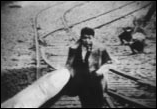|
|
 |
Director, Photography, Editing: Kawanaka Nobuhiro Source: Image Forum Fudousankaikan 6fl. 3-5 Yotsuya, Shinjuku-ku, Tokyo 160-0004 JAPAN Phone: 81-3-3357-8023 / Fax: 81-3-3359-7532 e-mail: imageforum@asahi-net.or.jp JAPAN / 1996 / Japanese with English subtitles / Color / 16mm/ 103 min |
| The "shishosetsu" or "I-novel" has been the dominant form of modern
Japanese literature, one based on the assumption that realism
in the novel can only be founded on authenticated personal experience.
Fiction and autobiography thus overlap when the author concentrates
on narrating his or her own life and feelings. The form is obviously adaptable to the personal documentary, but Kawanaka Nobuhiro's Shishosetsu differs from the "search-for-self-identity" prevalent in the work of his younger colleagues. While they turn the camera on themselves to confirm their own existence, rarely questioning the status of the image itself, Kawanaka's film always maintains a division between the image and its narration, devoting itself to the issue of how to write the self in film. Itself a new perspective on previous versions of the "Shishosetsu" series, Shishosetsu less relates Kawanaka's life than the cinematic traces of it, utilizing the mediating acts of editing together different texts and adjusting film speed to recombine, slow down, or speed up the 8mm films he has shot over the years, reading them anew from the present perspective. The adjustment of time (film speed) as a means of distinguishing past from present, experience from its narration, makes Shishosetsu an exercise in personal memory in which cinema itself represents the memories. The passing of the seasons and the passing away of people (Terayama Shuji, Kawakita Kazuko, Emperor Hirohito) provide the central motifs for a film deeply concerned with what traces of life will remain as time goes by. For Kawanaka, a leading filmmaker and educator, willfully recording the faces of everyone he has known but presenting it in silence, it is the cinematic image itself, his largely wordless appropriation of the "shishosetsu," which will be his memorial. --Aaron Gerow |